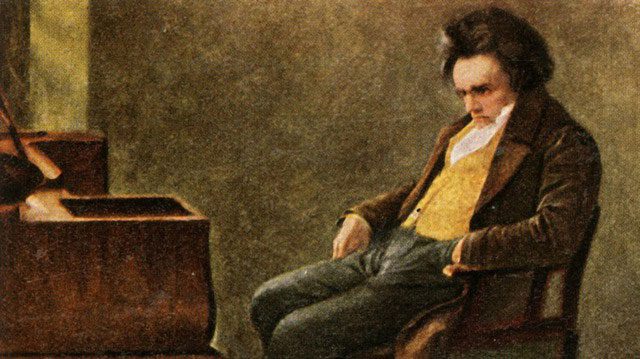Ludwig van Beethoven is a renowned classical composer from Germany. He is a significant musical figure during the transition from the Classical era to the Romantic era, often regarded as the pioneer of Romantic music.
Nearly 200 years after his death, as noted by Britannica, Ludwig van Beethoven is still considered by many to be the greatest composer in the world. Some of his most famous works include: Symphony No. 5, Moonlight Sonata, and many others (via Classic FM). According to Biography, Beethoven received his musical training from his father, who hoped his son would be recognized as a musical prodigy. Ultimately, Ludwig was able to achieve success through his rigorous practice and torment. In 1792, the German-born musician moved to Vienna to study under Joseph Haydn, a composer regarded as equal to the recently deceased Mozart.

Beethoven is considered the pioneer of the Romantic music era.
Beethoven was born in Bonn, in the Holy Roman Empire, to Johann van Beethoven (1740-1782), who was of Flemish descent, and Magdalena Keverich van Beethoven (1745-1787). Until recently, many references considered December 16 as Beethoven’s “birthday,” as he was baptized on December 17.
Historical accounts indicate that Beethoven honed his piano skills with Haydn and established himself as a master musician. Another article from Classic FM reports that by his mid-20s, he was regarded as a prominent pianist and composer across Europe. However, it was during this time that Beethoven discovered he was losing his hearing. Despite this, he continued to compose and perform, and in fact, at that time, no one knew that Beethoven was on the verge of deafness.
Classic FM states that he did not reveal his secret to anyone until he wrote a letter to a childhood friend in 1800. In the letter, he mentioned: “For two years, I have avoided almost all social gatherings because I cannot tell people that I am deaf.” Beethoven continued to express that he was hiding his disability for fear it would ruin his reputation and career.

No one is sure exactly what caused his deafness.
Throughout his life, Ludwig van Beethoven endured significant physical suffering. The cause of his ailments remains a topic of research among scientists. At one point, it was believed that Ludwig van Beethoven suffered from congenital syphilis.
Theories Regarding Beethoven’s Hearing Loss
In fact, today we find numerous reports concerning the onset of Beethoven’s hearing loss, but the specific age at which this occurred varies greatly. Classic FM states he was 26, while PBS claims he was 28. Regardless, it can be agreed that no one is certain exactly what caused his deafness.
Some believe it was the result of typhus, syphilis, lupus, or even Paget’s disease, a chronic bone disorder. Similarly, Interlude mentions that Beethoven himself attributed it to a severe fall, where his face hit the floor, marking the beginning of his deafness. Shortly thereafter, he began experiencing persistent tinnitus.
According to Interlude, Beethoven’s left ear was the first to be affected by his hearing loss. From there, his condition worsened. He seemed to be able to hear certain sounds until he was about 40. By the time Beethoven was 44 or 45, he was completely deaf. California Symphony reports that his hearing loss plunged him into severe depression. He ceased performing and appearing in public, becoming a recluse. Nevertheless, Beethoven continued to compose music.
California Symphony points out that the themes of his works changed, reflecting his life without sound. On March 26, 1827, Ludwig van Beethoven passed away in Vienna at the age of 56.
DNA Testing
PBS states that throughout his life, Beethoven suffered from various health issues. These included abdominal pain, respiratory problems, joint pain, eye inflammation, and more. However, an article in the Western Medical Journal suggests that Beethoven died from prolonged alcohol abuse due to his depression, which also stemmed from his hearing loss.
Upon his death, a lock of his hair was cut by a musician named Ferdinand Hiller. The last lock of hair we can find today is in Denmark, owned by Kay Fremming, a doctor who saved many Jewish families from the Nazis during World War II.
It is unclear exactly how he came to possess that lock of hair. However, Fremming later gave it to his daughter, who eventually auctioned it off. This lock of Beethoven’s hair was subsequently transferred to San Jose State University in California, where it underwent numerous tests to provide insight into the reasons for his deafness.
In 2000, a report from The Advanced Photon Source indicated that the hair contained a very high lead content and it is possible that Beethoven suffered from lead poisoning. This could likely have caused various health issues and possibly deafness as well. A later study in 2013 also suggested that lead from wine contributed to Beethoven’s hearing loss. However, since Beethoven passed away hundreds of years ago, the true reason for his deafness will forever remain a mystery.



















































